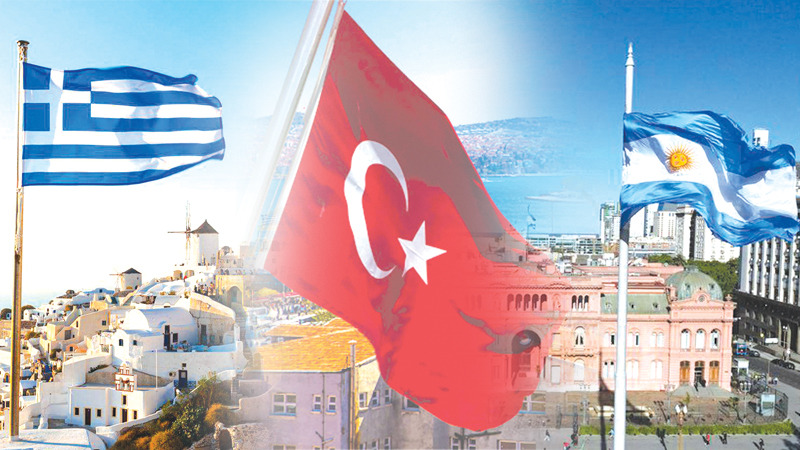During the past two months in the world economy, many discourses have been going on in various platforms regarding the silent recession. This new crisis has several characteristics similar to the crisis that led to the fall of Latin American economies in the 1980s.
This silent recession has been given special attention by the mainstream media. The reasons were the Ukraine-Russia war, the instabilities in the Middle East, and the inflationary conditions built by developed countries.
A special fact that is said here is that the credit crisis is gradually becoming serious in the world. As a result, twenty-eight countries have already defaulted or are close to defaulting. There are two reasons that contributed to this situation.
One is the Covid-19 pandemic. The other is that the last decade has seen high interest rate levels in relation to developed countries. As a result, the cost of credit increased greatly, and due to this, the interest rate on loans received and loans expected to be received by developing countries increased.
 Also there was an increase in expenses. When downgraded economies went to the debt market, they had to borrow at very high interest rates. Due to that, the pressure on countries with higher debt burdens increased rapidly.
Also there was an increase in expenses. When downgraded economies went to the debt market, they had to borrow at very high interest rates. Due to that, the pressure on countries with higher debt burdens increased rapidly.
Efforts are being made to get relief as a result of this rapid rise. About ten countries are on the debt relief list. Examples are Sri Lanka, Ghana, Zambia and Lebanon. Also, countries such as Congo, Ghana, Lao, Malawi, Somalia, Sudan, Zimbabwe, Zambia and the Maldives are very close or have already fallen into the debt crisis. It is clear from history that the socio-economic political crises that arise with the debt crisis and steps taken could have solved the crisis.
Let’s focus on four countries that have gone into a debt crisis and have not been able to end the debt crisis successfully despite receiving the assistance of the International Monetary Fund.
Argentina went into crisis for the first time in 1982. There was a US$ 40 billion loan default. There, the country moves to a hyperinflationary State. Economic uncertainty rises dramatically. The cause of this crisis in 1982 to a certain extent is the beginning of the Falklands war with the UK. Following this, the economy continued to collapse until 1990. After that, it moved to an economic stabilisation program.
There the support of the IMF was obtained. With their support, this debt stabilisation program moved forward amid various obstacles. From time to time, political instability moves back and forth and with political change comes further borrowing from the credit market.
Public expenditure
Necessary attention is not given to the areas of increasing taxes and cutting public expenditure. As a result, in 2001 it goes back to crisis. At that time, there will be a default of more than one hundred billion.
In a sovereign bond default, the economy collapses massively. Any Government that comes to power will stay in power for a very short time and lose power in a short time. That is, the economic crisis is turning into a big political crisis.
During this period, Argentina underwent a significant debt reduction under the debt restructuring process in 2001. However, Argentina was not able to sustainably build its economy.
The governments that came to power failed to provide sustainable answers to the basic economic problems and to maintain them in a stable manner.
Governments that have come to power have always tried to increase public expenditure by promising to reduce the pressures on the people, increase the amount of public debt without taking steps to increase taxes, and run public businesses without reforming.
As a result, Argentina once again went into an economic crisis in 2018. It incurred US$ 57 billion in debt and went into default. Inflation rose again, the currency collapsed, the economy destabilised again and unemployment increased. And again Argentina went to the IMF.
Argentina is in a sort of debt trap and is caught in a debt cycle where interest payments on new market loans rise as defaults occur. If you take a loan at a high interest rate, the loan defaults when the debt burden increases. This goes in a circular fashion. The main reasons are the failure to carry out necessary reforms to build the economy in a sustainable manner.
The economic program maintained under one Government will stop in the middle under a new Government. It was a strong factor influencing Argentina’s debt crisis for 40 years. Argentina’s per capita income is up to seven thousand five hundred. Chile, which was behind Argentina, has increased its per capita income to about 15,000 dollars.
Greece goes into debt crisis in 2010. The expansion of Greece’s economic situation, particularly through the expansion of the budget, affected its debt repayment difficulties. The Greek market suffered a rapid collapse. The difficulty in repaying the debt due to the risky situation related to the economic policy is fundamental here.
Greek bond values rose rapidly. As a result, Greece faced a huge debt budget deficit. As the Greek State was run as a large welfare institution, had to meet this budget, the IMF and the European Union reached an agreement and launched a program to save the economy during 2011 and 2012, and various measures were taken.
There, the IMF and the European Union come forward to support the debt crisis. But at that time the loan was taken under a number of conditions
Cutting welfare for public sector employees, increasing tax revenue, reforming public enterprises, and cutting public spending happened accordingly. Although such measures were taken in the midst of massive protests, the end result was a return to crisis in 2015. Then the Left-wing Government that came to power promised to completely tear up the agreements made with the IMF.
Greece
After that, the European Union temporarily stopped the IMF program. Due to Greece’s economic recession, the Left-wing party is once again trying to reach an agreement with the European Union and the IMF. Entering into the new covenant is more conditional than before.
Even then, inflation was moving upwards and economic growth was moving downwards. Therefore, the socialist leftist Government will have to bow its knees before the IMF and the European Union. As a result of the political crisis within that party and the collapse of that party on the other hand, a new Government was formed in 2019.
In the same way, the main political parties came to power. Once again, work with the IMF and the European Union is continuing. Also, even if there was some recovery in the economy, Greece was not able to completely get out of the economic crisis. The forecasts for the Greek reset are only that the program will continue until 2031. Also Greece is the best example of prolonging painful situations in arbitrary action.
In 1994, Turkey went into an economic crisis. The high Government budget gap led to a massive devaluation of the exchange rate. Short-term loans were taken to keep the exchange rate stable. Due to this increase in debt, a credit crisis occurred. However, in 2001, Turkey once again went into an economic crisis.
The main cause of this crisis is political and financial instability. There was instability especially in the banking sector. As a result, the lira currency collapsed.
It was arranged to reach an agreement by discussing with the IMF once again. But subsequent governments carried out reforms related to the financial system. There too, the reforms related to maintaining the public finances were not done properly. As a result, the economy crashed again in 2018.
As the currency collapses, inflation and debt will rise. Geopolitical reasons also affected this. So, once again there were negotiations with the IMF and it was allowed to proceed. Due to the high level of indebtedness, the collapse of the currency unit and the emergence of a risky situation in the banking sector led to Turkey’s debt crisis.
Ecuador went into an economic crisis in 1999. It happened due to the decrease in bank reserves as well as the financial sector.
Dollarisation of the economy took place due to the increase in debt burden. That is, the currency of the country was changed to the US Dollar. Stabilisation of the economy was also not successful. As a result, economic crisis happened once again.
There was also default on foreign loans. The then Government of Ecuador had to get some relief through debt restructuring. Despite moving forward in this way until 2008, Ecuador’s economy once again collapsed. The country brings forward the opinion of illegal loans regarding the loans received from other countries and that opinion is completely rejected by the countries that gave the loans.
Ecuador
Debt restructuring brought some relief. Ecuador is heading back to the IMF in 2020. A package of US$ 6.5 billion was given. Despite attempts to reduce the debt burden, lending was restricted due to lack of specific data on loans taken.
Ecuador achieved a favourable position in the 2008 debt restructuring. This is not enough to avoid another debt crisis.
After that, Ecuador was given this loan at a high rate of interest. It also restricted lending to the country.
If Ecuador does not understand how to manage the loan properly, the loan was restricted with the intention of paying special attention to the proper and legal use of the loan.
Due to the use of loans for various things in the country, the interest rate increased and on the other hand, lending parties restricted the loans.
There the country once again went into a debt crisis. A fact that Jamaica has been accepted as a country that has recently rebounded after an economic crisis, by referring to the IMF, shows the importance of a common consensus of all political parties, including the public, towards nation building.
They understand that the crisis will not re-occur in going that route. Jamaica worked to ensure that it would not be humiliated in front of the international community. It is important for everyone to go on one journey to build the country.
Jamaica is setting a precedent for countries that have received help from the International Monetary Fund in economic crisis but have repeatedly gone into crisis.
Translated by Jonathan Frank







